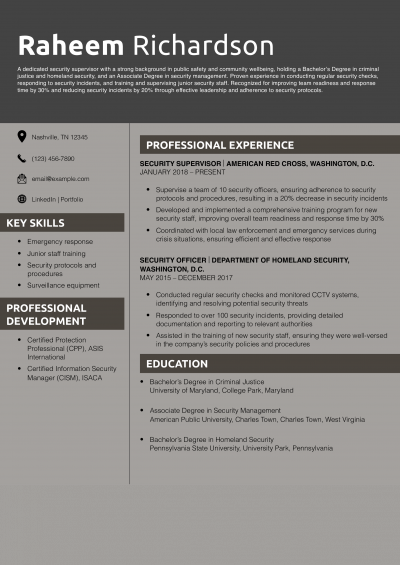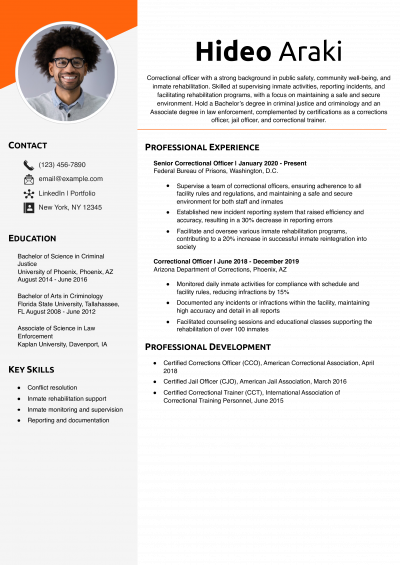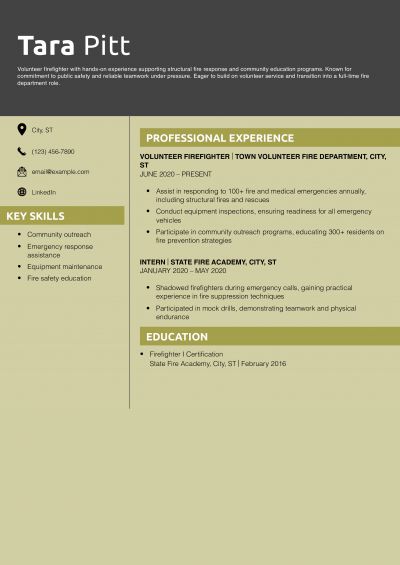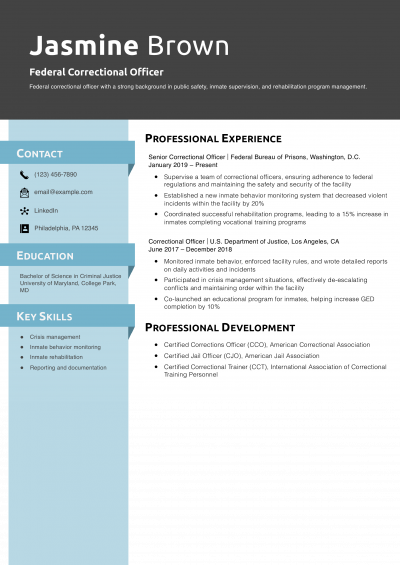A good law enforcement resume focuses on your main strengths like community policing, crisis management, or interagency collaboration. Give examples of your success as a law enforcement officer or in similar roles, and show your knowledge base by citing any degree or certificate programs you’ve done. This guide provides expert tips to help you create a persuasive resume showing your best law enforcement skills.
Key takeaways:
- Brainstorm details about your work history on a separate document or sheet of paper. Then, identify the most relevant ones to feature in your experience section – this helps you focus your resume on law enforcement.
- Spell out the positive impact of your work in law enforcement. Describe how your efforts helped the wider organization and community.
- Follow the combination resume format to provide all required information while positioning yourself for law enforcement jobs that interest you.
Most Popular Law Enforcement Resumes
Law Enforcement Officer Resume Example
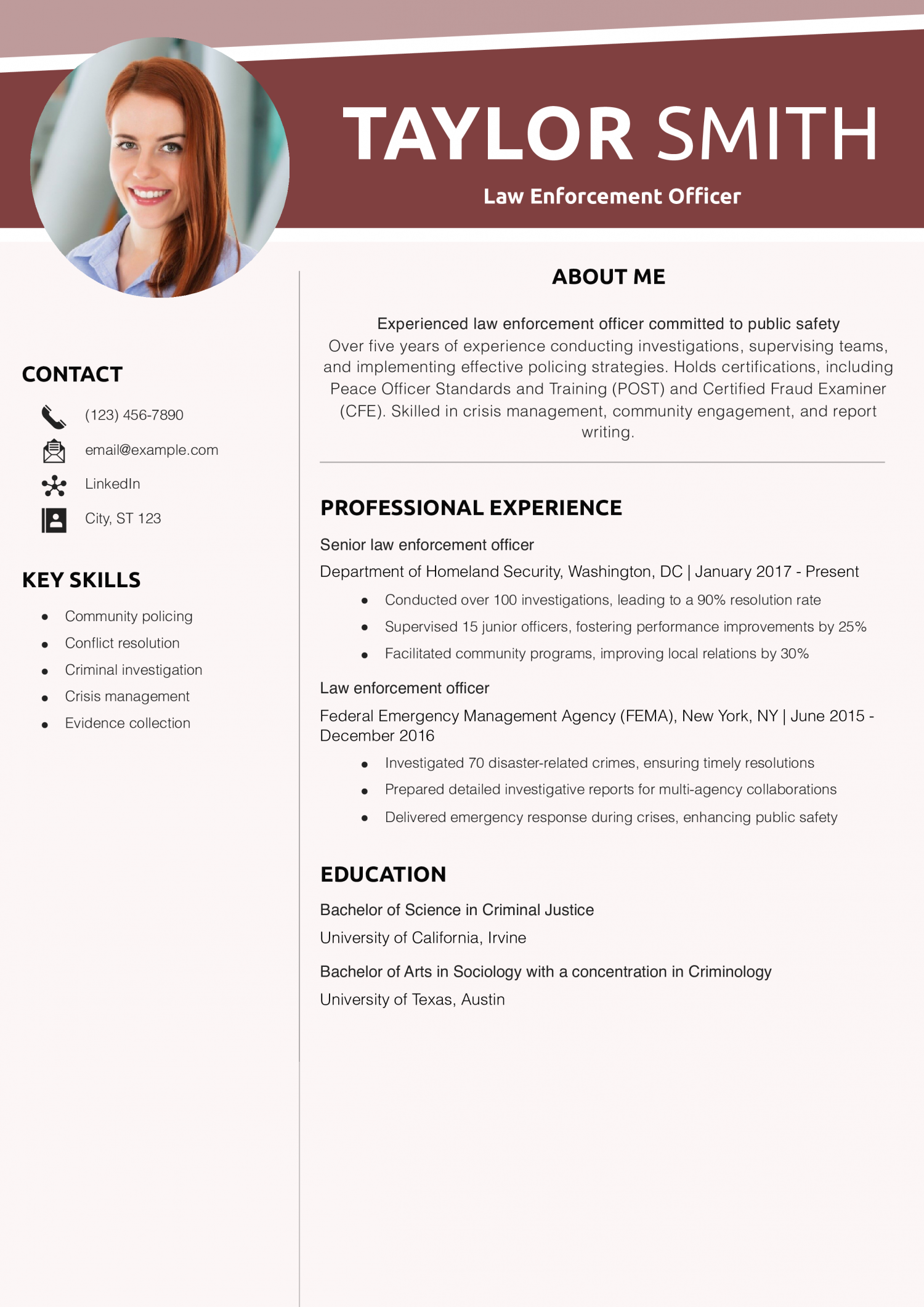
Why This Resume Is a Great Example
This resume effectively showcases his expertise in conducting investigations, supervising teams, and engaging with the community, all of which are important for a law enforcement officer. It highlights not only his years of experience but also measurable achievements like a 90% resolution rate.
Key Tip:
Focus on quantifying accomplishments to show the impact of your work.
Entry-Level Law Enforcement Officer Resume Example
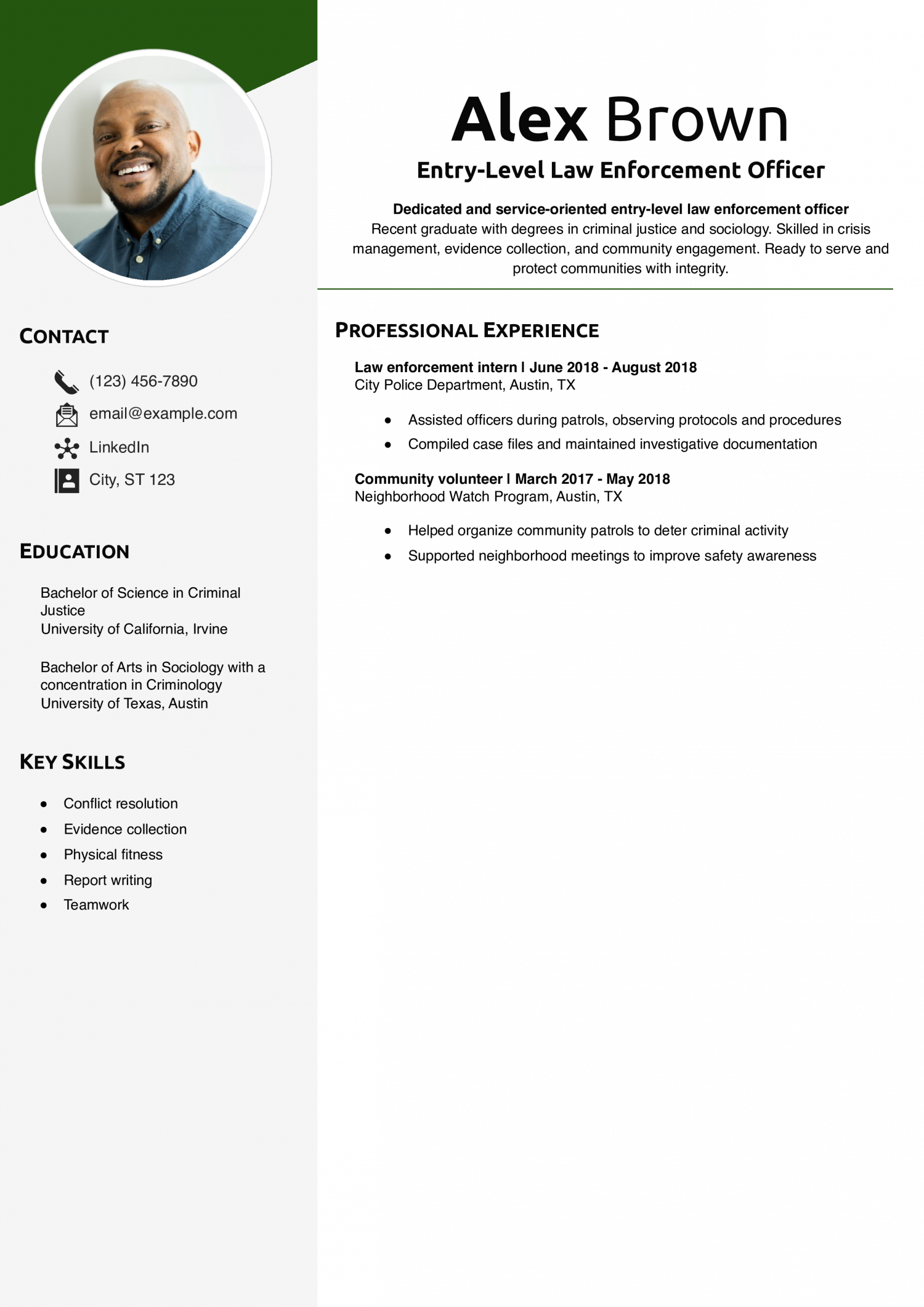
Why This Resume Is a Great Example
This resume demonstrates motivation, relevant training, and a readiness to contribute to public safety. Despite having limited experience, he uses internships and volunteer roles to showcase essential law enforcement skills.
Key Tip:
Even entry-level resumes can stand out with the right structure.
Federal Law Enforcement Officer Resume Example
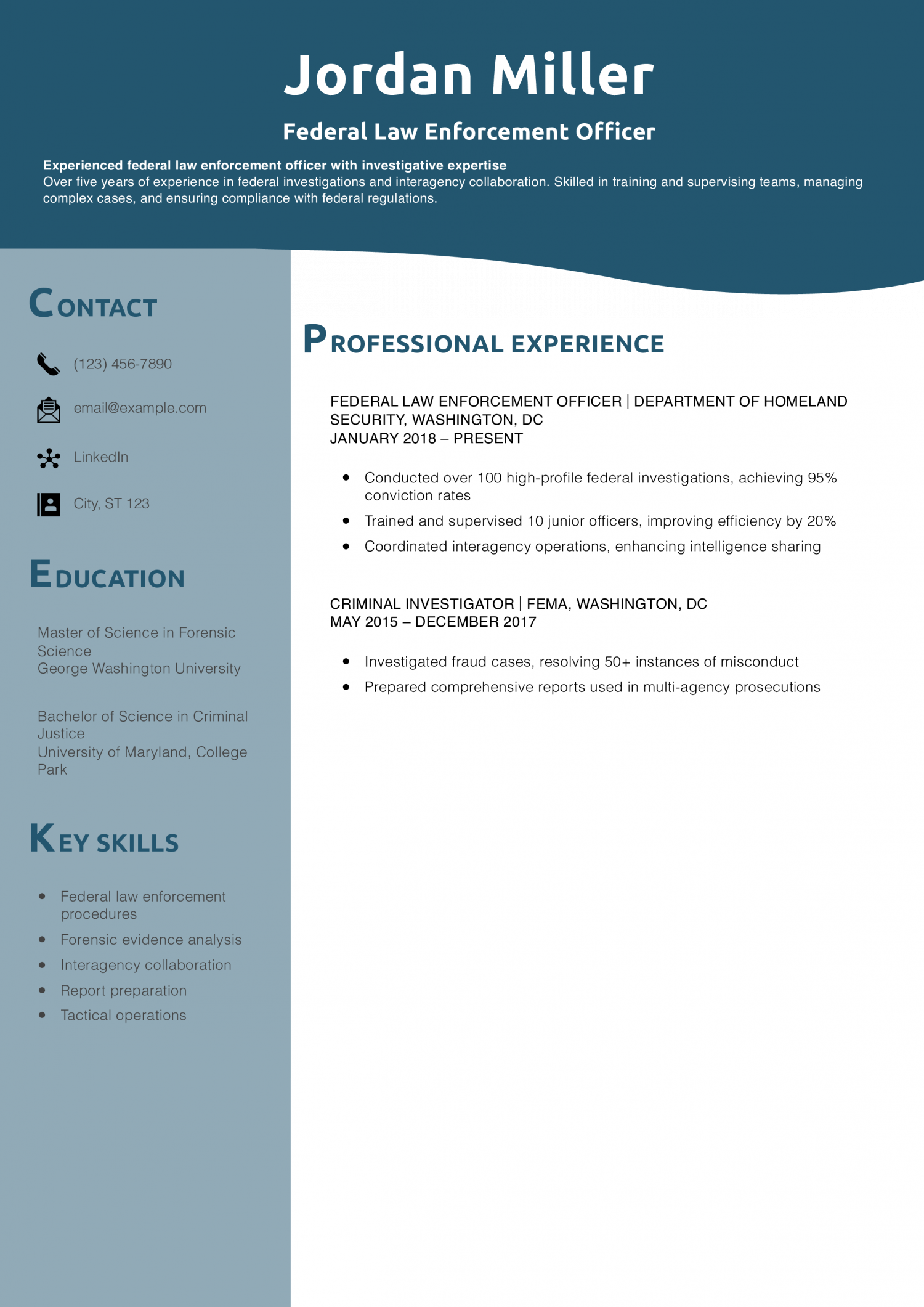
Why This Resume Is a Great Example
This resume features measurable results and clear federal agency experience. It provides strong evidence of leadership and high-stakes investigations.
Key Tip:
Use industry-specific language and achievements when applying to federal roles.
Military to Law Enforcement Officer Resume Example
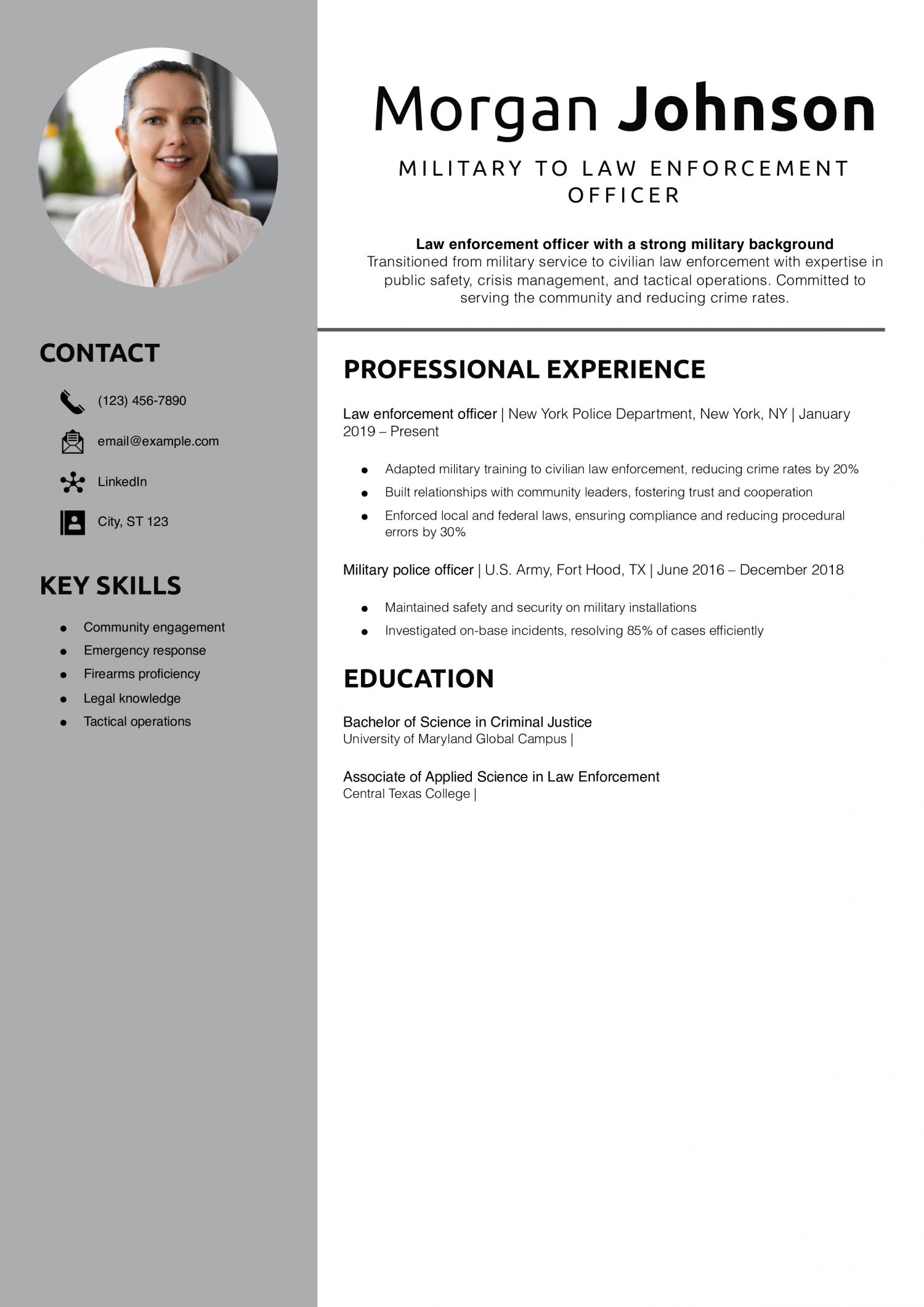
Why This Resume Is a Great Example
This resume bridges military service and civilian law enforcement. It clearly shows transferable skills, supported by performance outcomes.
Key Tip:
Translate military experience into civilian language.
Police Sergeant Resume Example
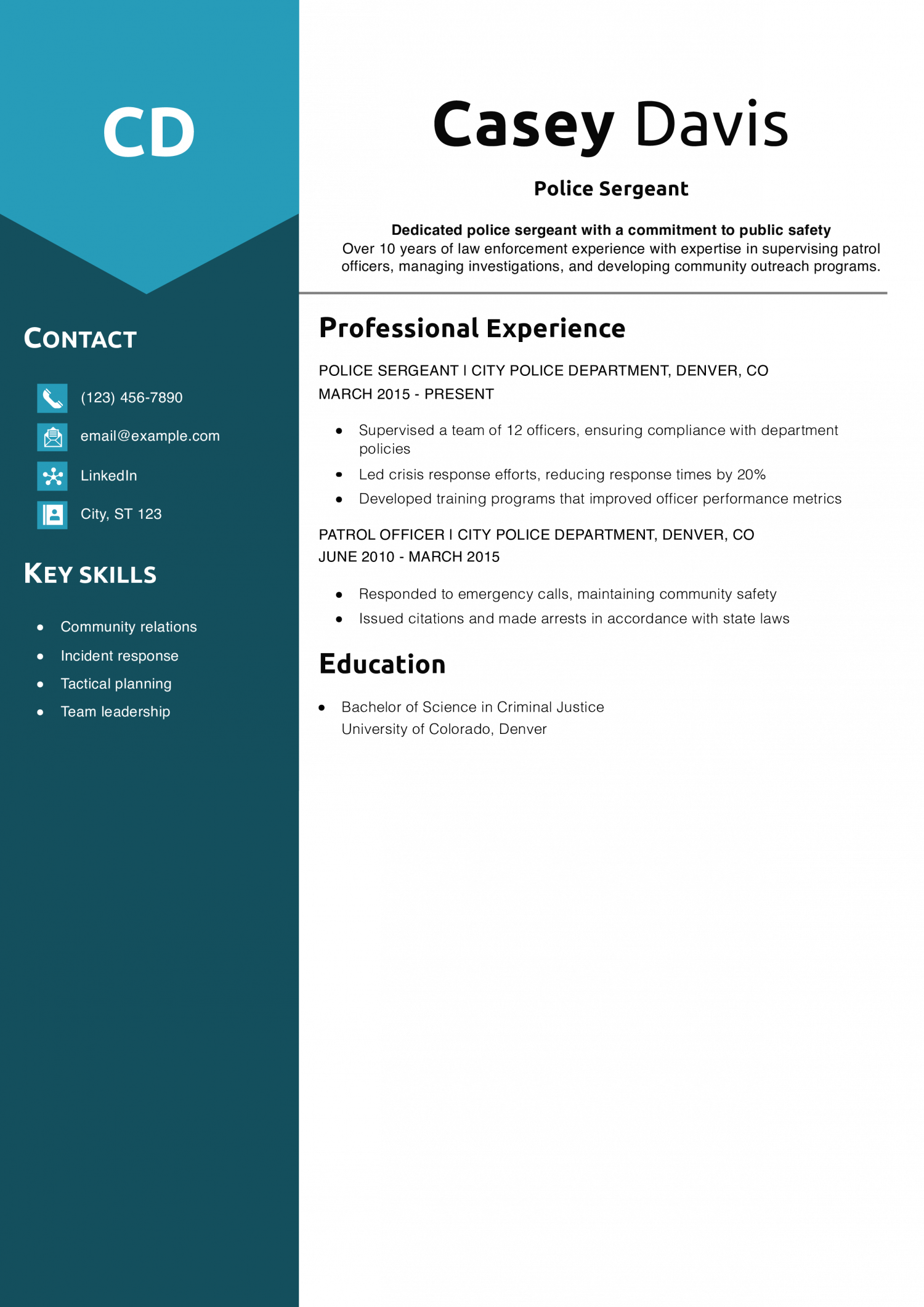
Why This Resume Is a Great Example
This resume emphasizes leadership and training, two core responsibilities of a sergeant. Clear metrics and responsibilities build a solid case for promotion or lateral moves.
Key Tip:
Highlight management experience and public impact.
Crime Scene Investigator Resume Example
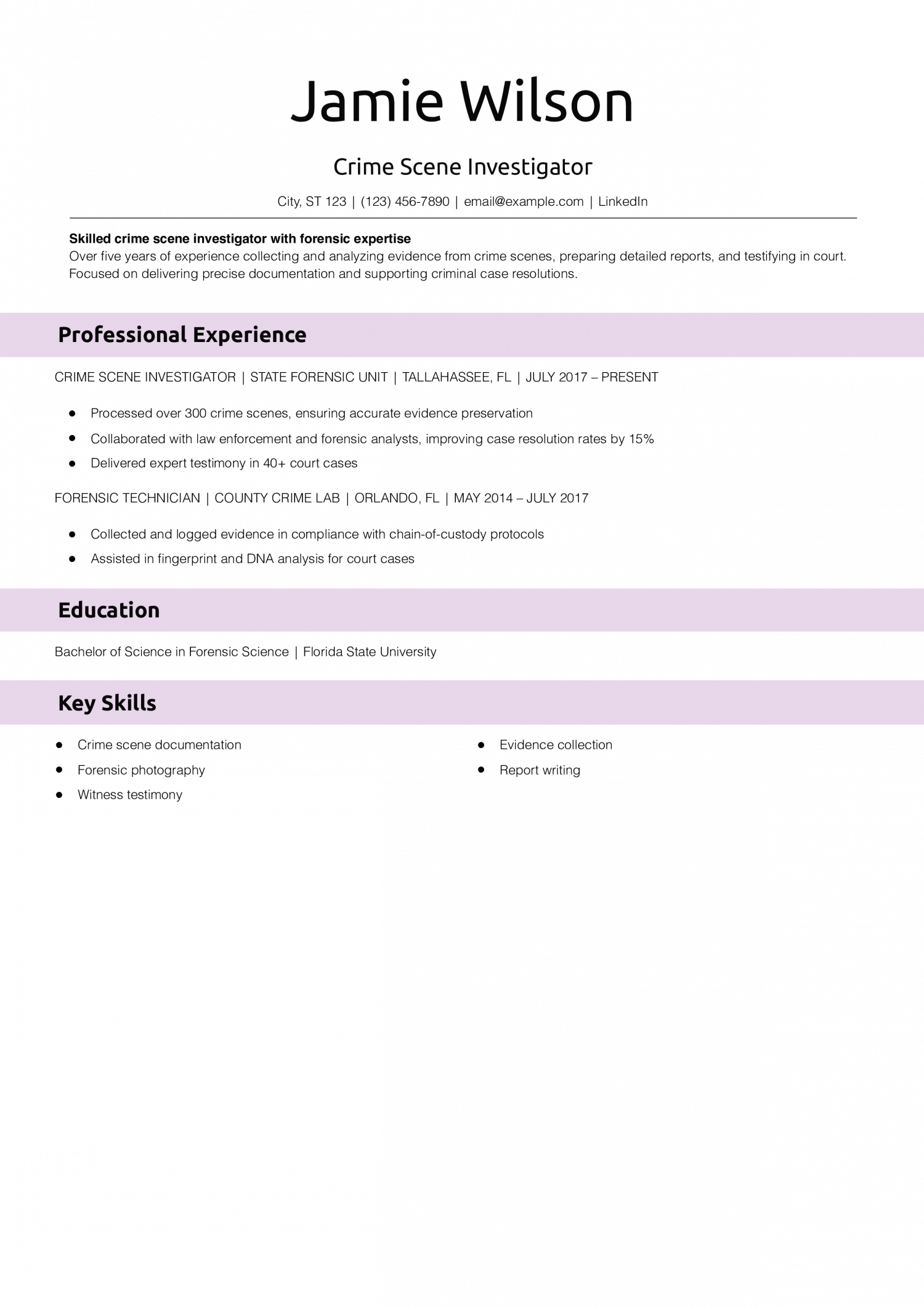
Why This Resume Is a Great Example
This resume clearly outlines forensic responsibilities and highlights courtroom contributions often overlooked in technical roles. Including both lab and fieldwork creates a well-rounded impression.
Key Tip:
Consider how to structure your resume to guide hiring managers through your strengths. Explore formatting options.
Border Patrol Agent Resume Example
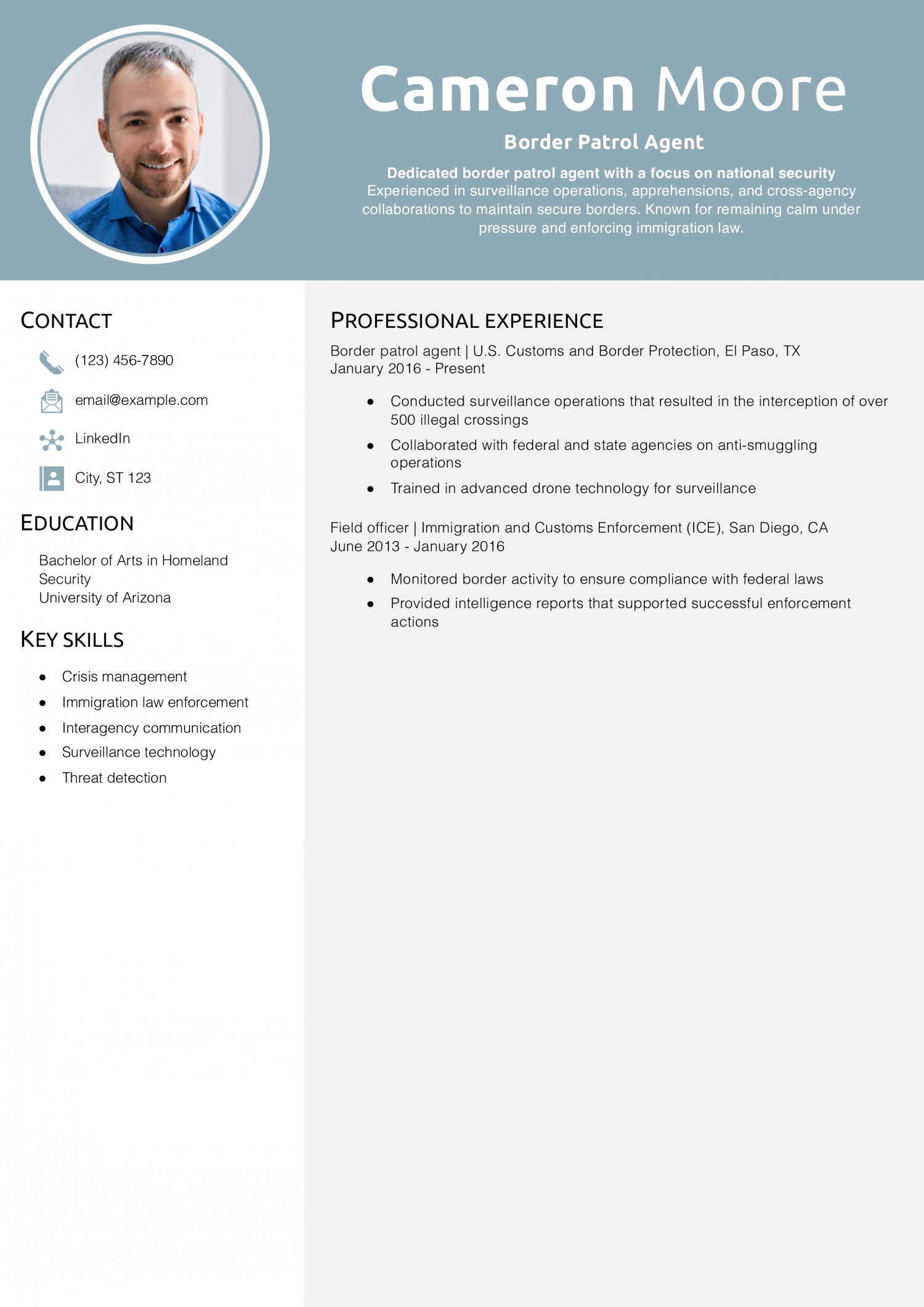
Why This Resume Is a Great Example
This resume demonstrates how to show career progression within the same field. Listing achievements alongside evolving responsibilities is a smart way to tell a career story.
Key Tip:
Tailor your resume to each opportunity using language from the job posting. Here’s why it matters.
Juvenile Probation Officer Resume Example
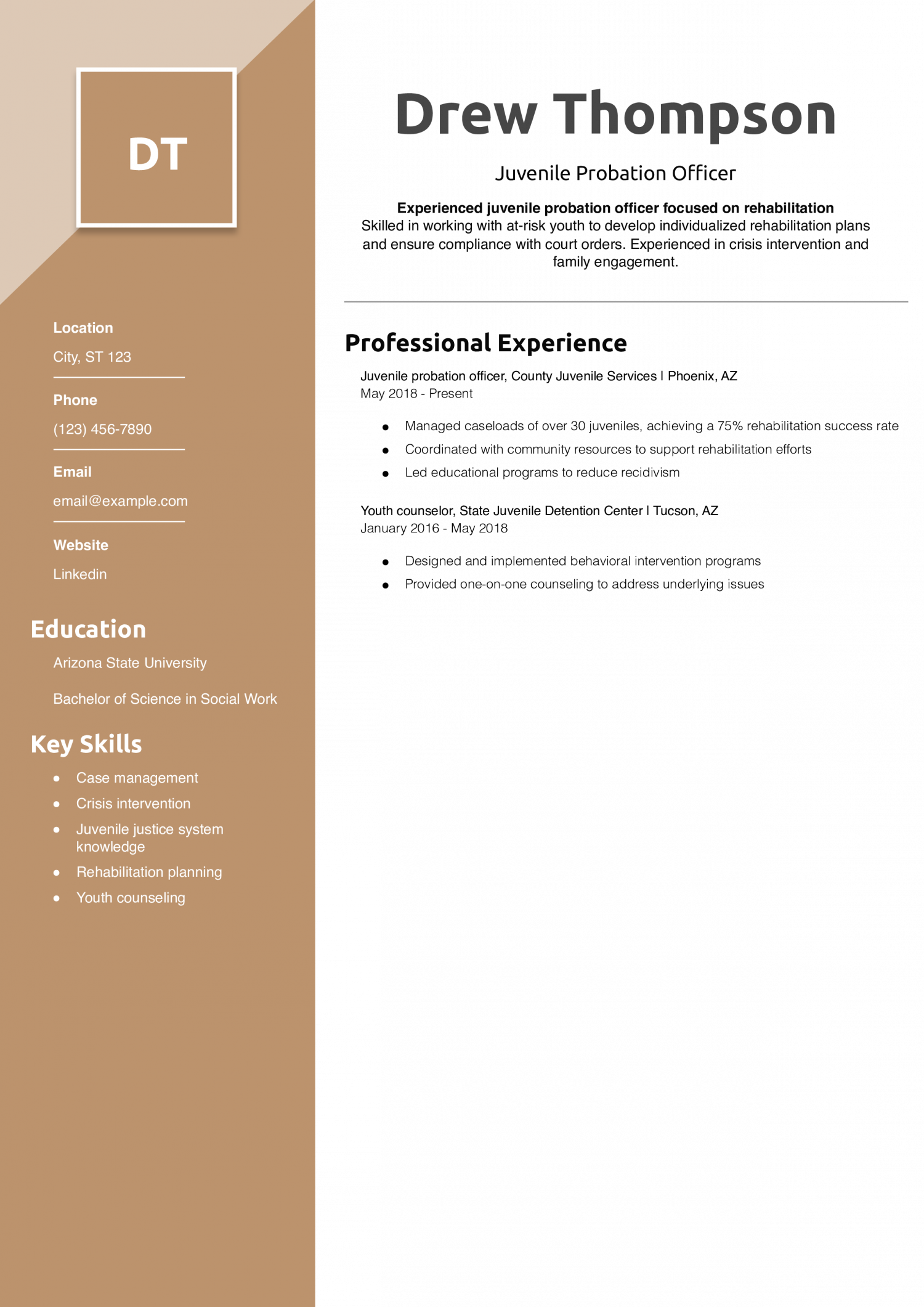
Why This Resume Is a Great Example
This resume is strong because it balances casework with social impact, showing a clear understanding of the juvenile justice system. Including specific outcomes like a 75% success rate adds credibility.
Key Tip:
Ensure your resume includes hard numbers to showcase your effectiveness. Learn how to add metrics.
SWAT Officer Resume Example
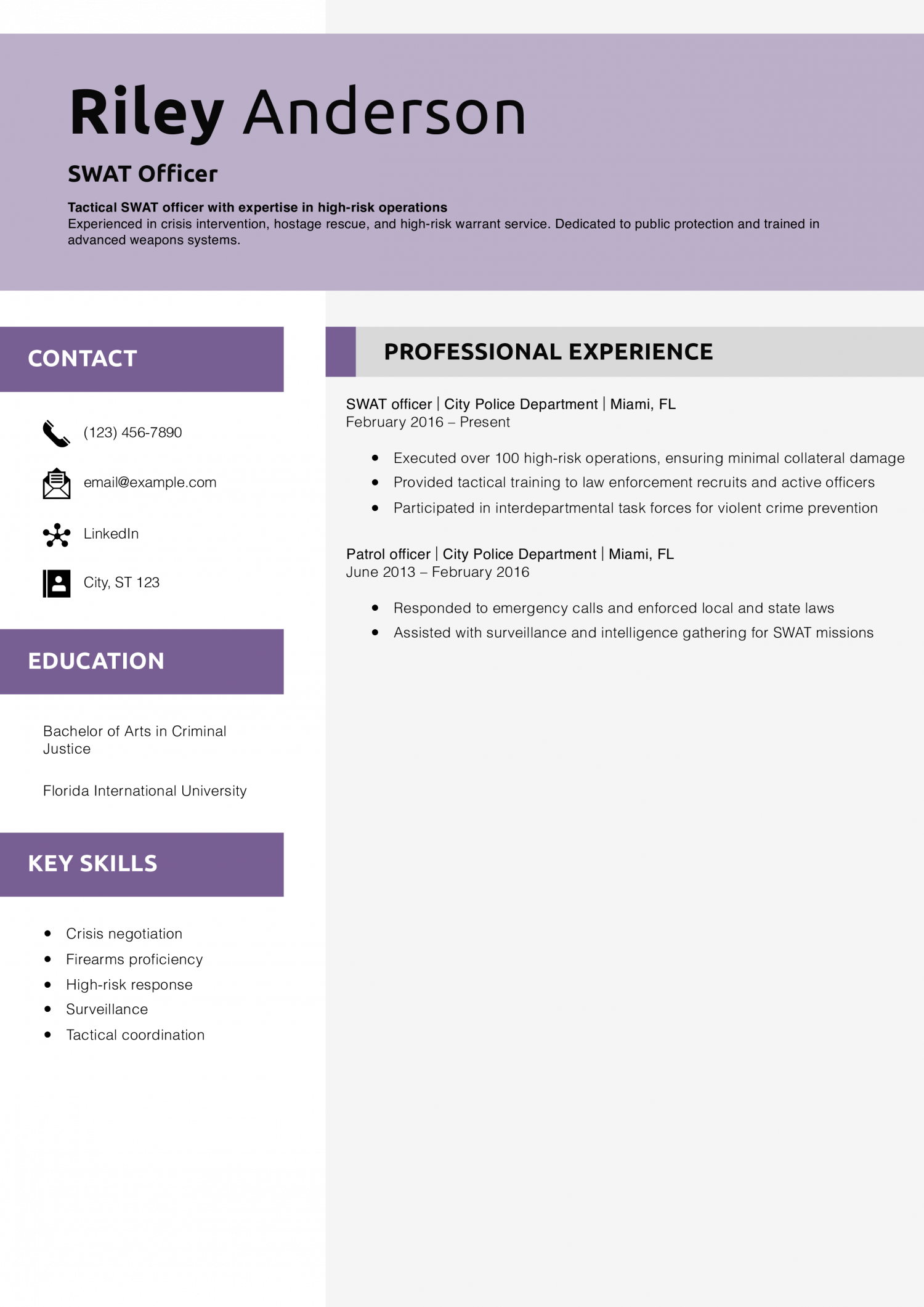
Why This Resume Is a Great Example
Riley’s resume clearly articulates the unique responsibilities of a SWAT role while still tying in community safety and officer training. This makes it appealing to departments with tactical needs.
Key Tip:
Want to stand out? Use a strong, focused summary.
K-9 Unit Officer Resume Example
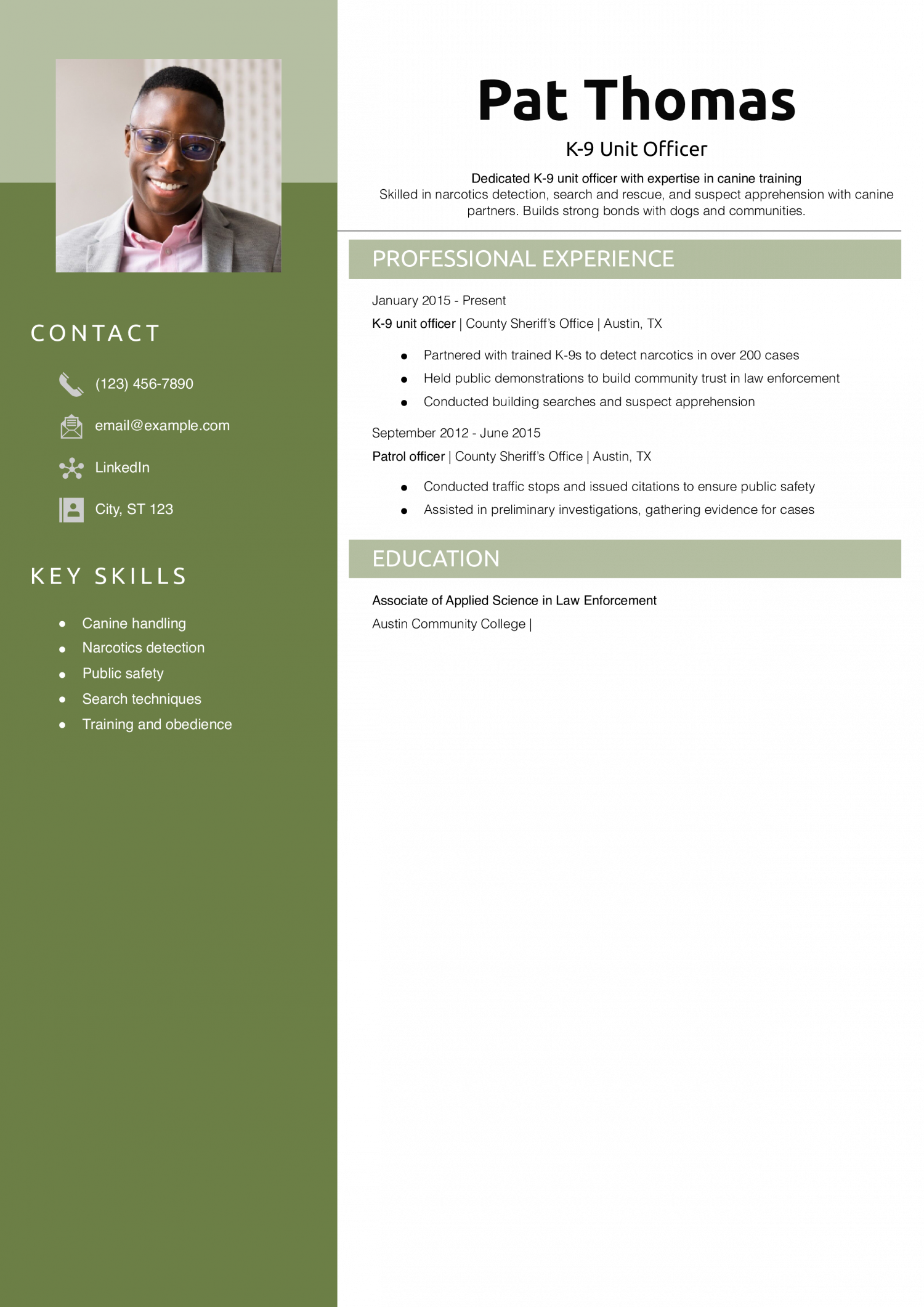
Why This Resume Is a Great Example
This resume includes niche skills like canine obedience and search tactics. These specialty experiences make it ideal for departments seeking highly trained K-9 units.
Key Tip:
Include unique certifications or training that align with the job description. Here’s what to list.
Undercover Narcotics Officer Resume Example
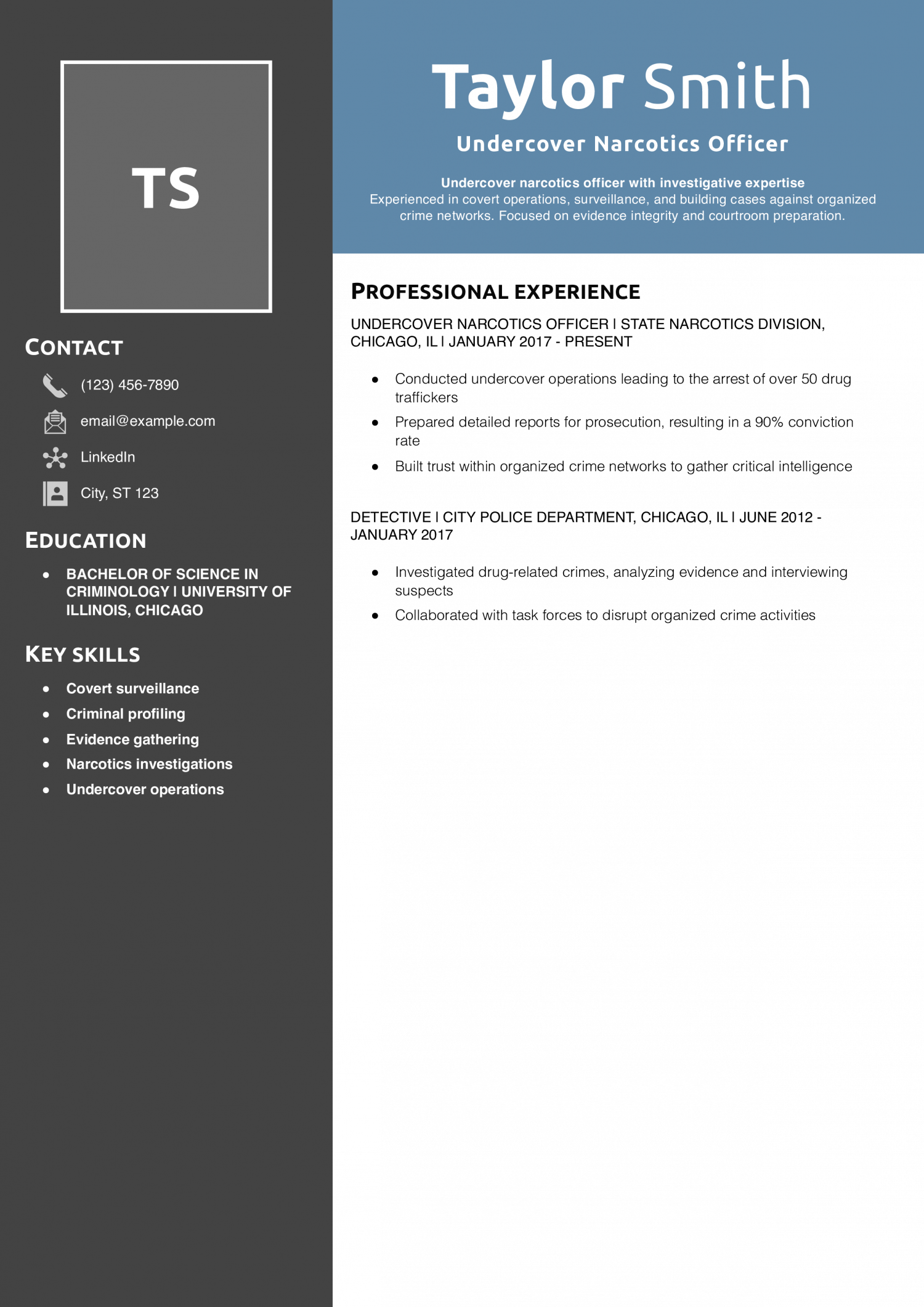
Why This Resume Is a Great Example
Taylor’s resume is bold and focused, capturing the intensity of undercover work while clearly documenting achievements.
Key Tip:
For roles like this, be specific about your role in case outcomes. See more job title tips.
Park Ranger Resume Example
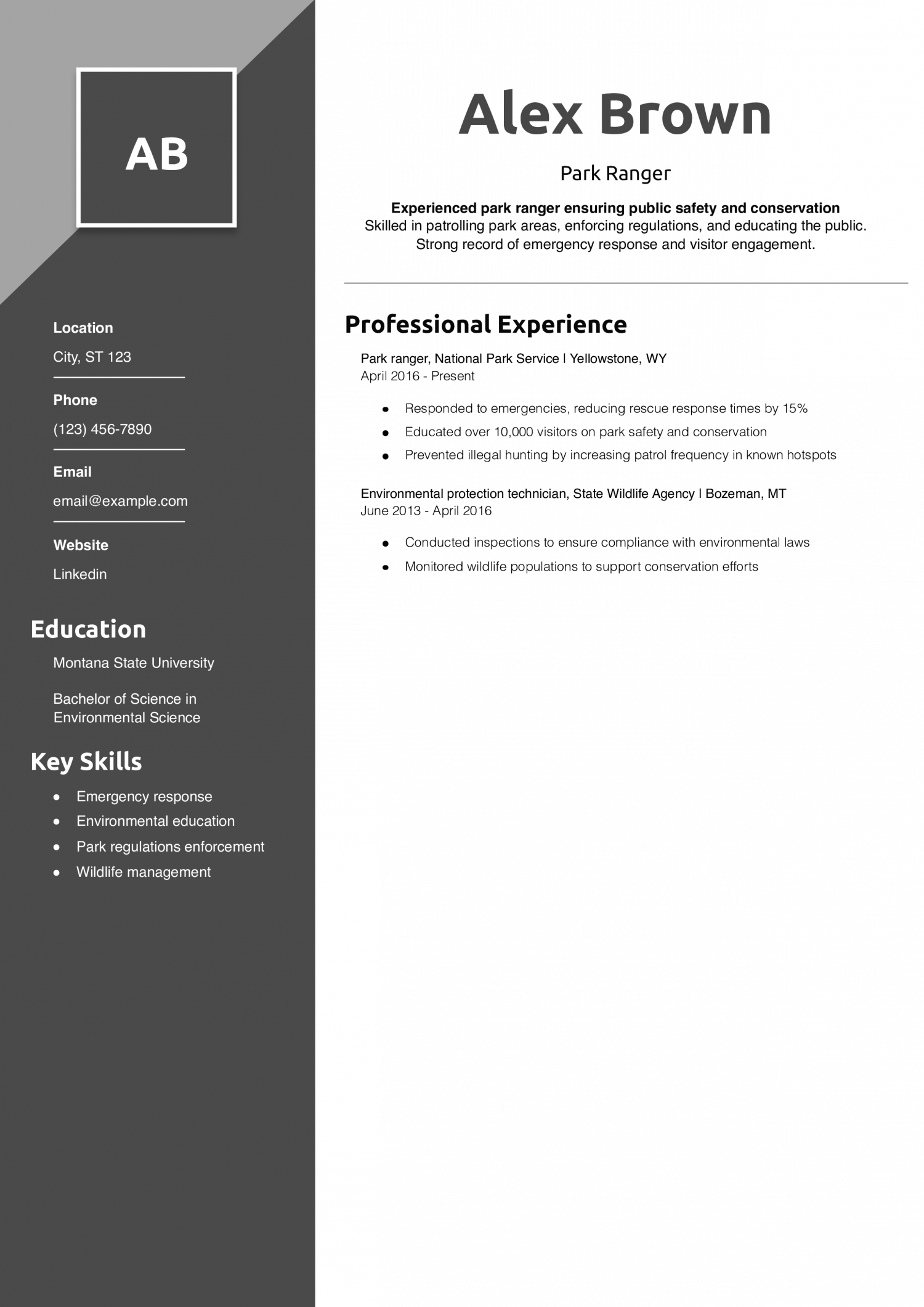
Why This Resume Is a Great Example
This resume balances law enforcement duties with environmental stewardship, which is essential for ranger roles.
Key Tip:
Use keywords like “compliance” and “monitoring” to pass applicant tracking systems.
Corrections Officer Resume Example
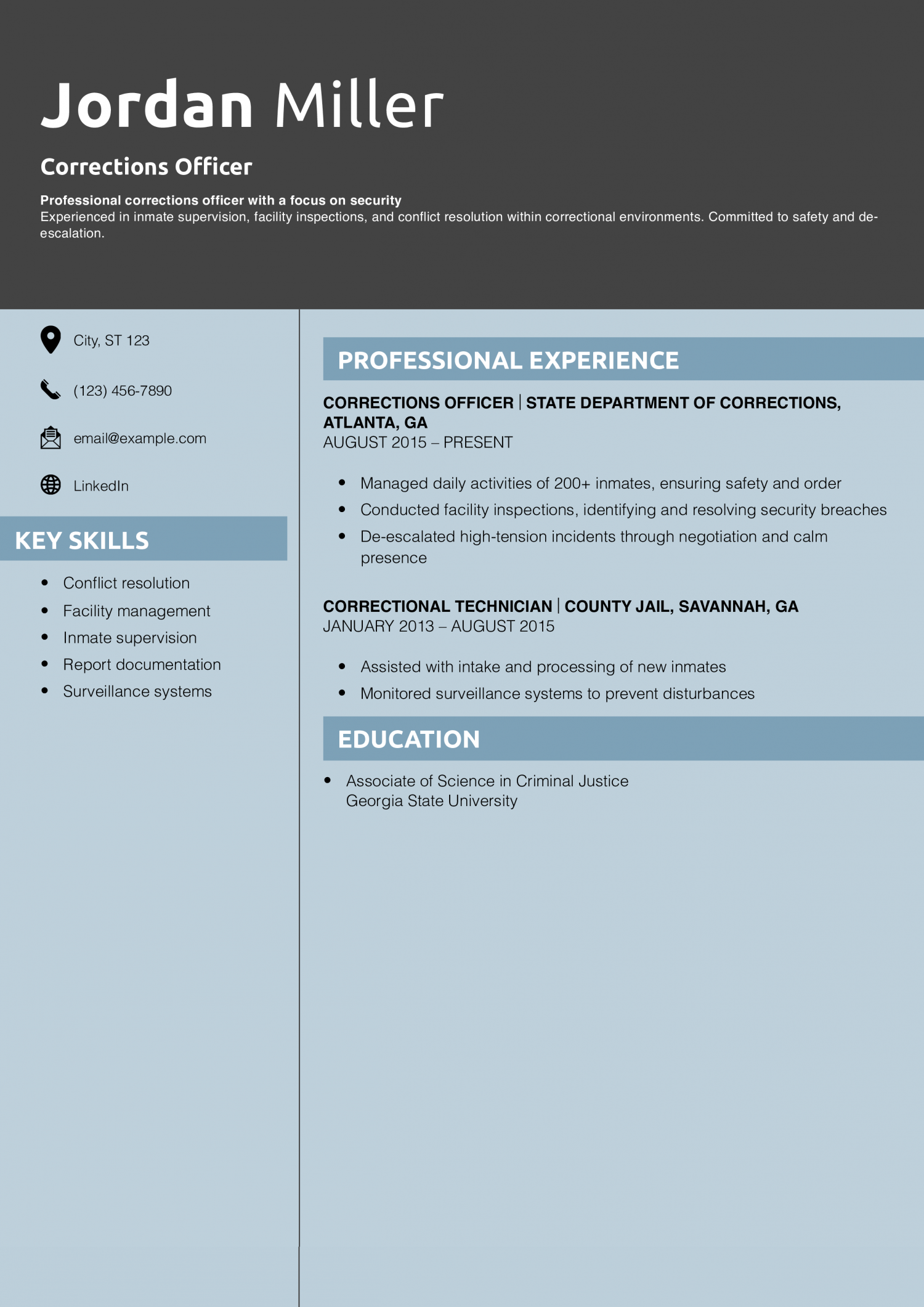
Why This Resume Is a Great Example
This experience is well-organized and focused on safety and facility control, which are critical in correctional roles.
Key Tip:
Listing tech skills like surveillance and logging can show you’re modern and detail-oriented. Add computer skills to your resume.
Fraud Investigator Resume Example
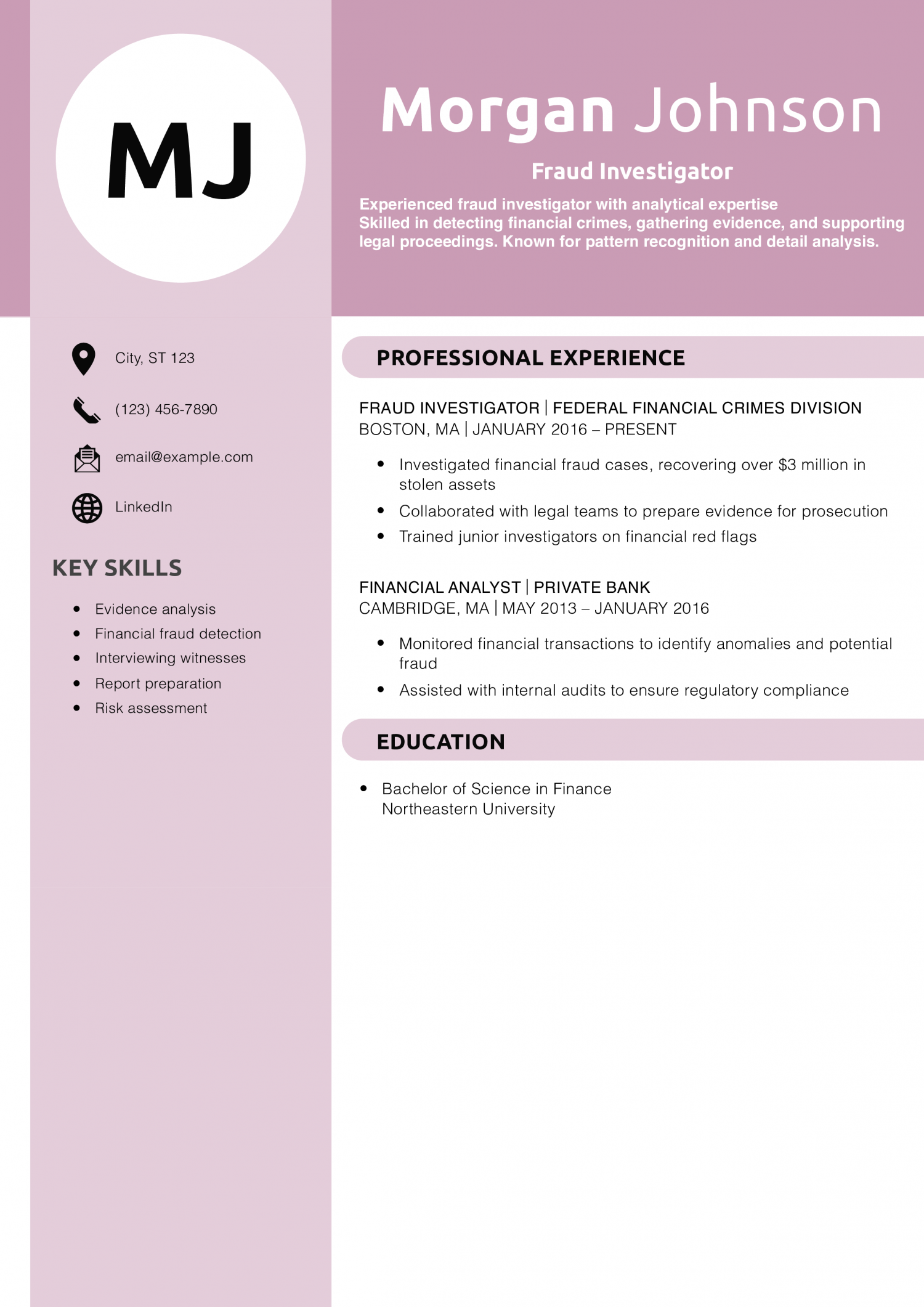
Why This Resume Is a Great Example
Morgan’s resume blends investigative acumen with financial analysis. The inclusion of recovered assets adds real-world weight.
Key Tip:
Highlight accomplishments with dollar values where relevant. How far should you go with resume details?
Community Liaison Officer Resume Example
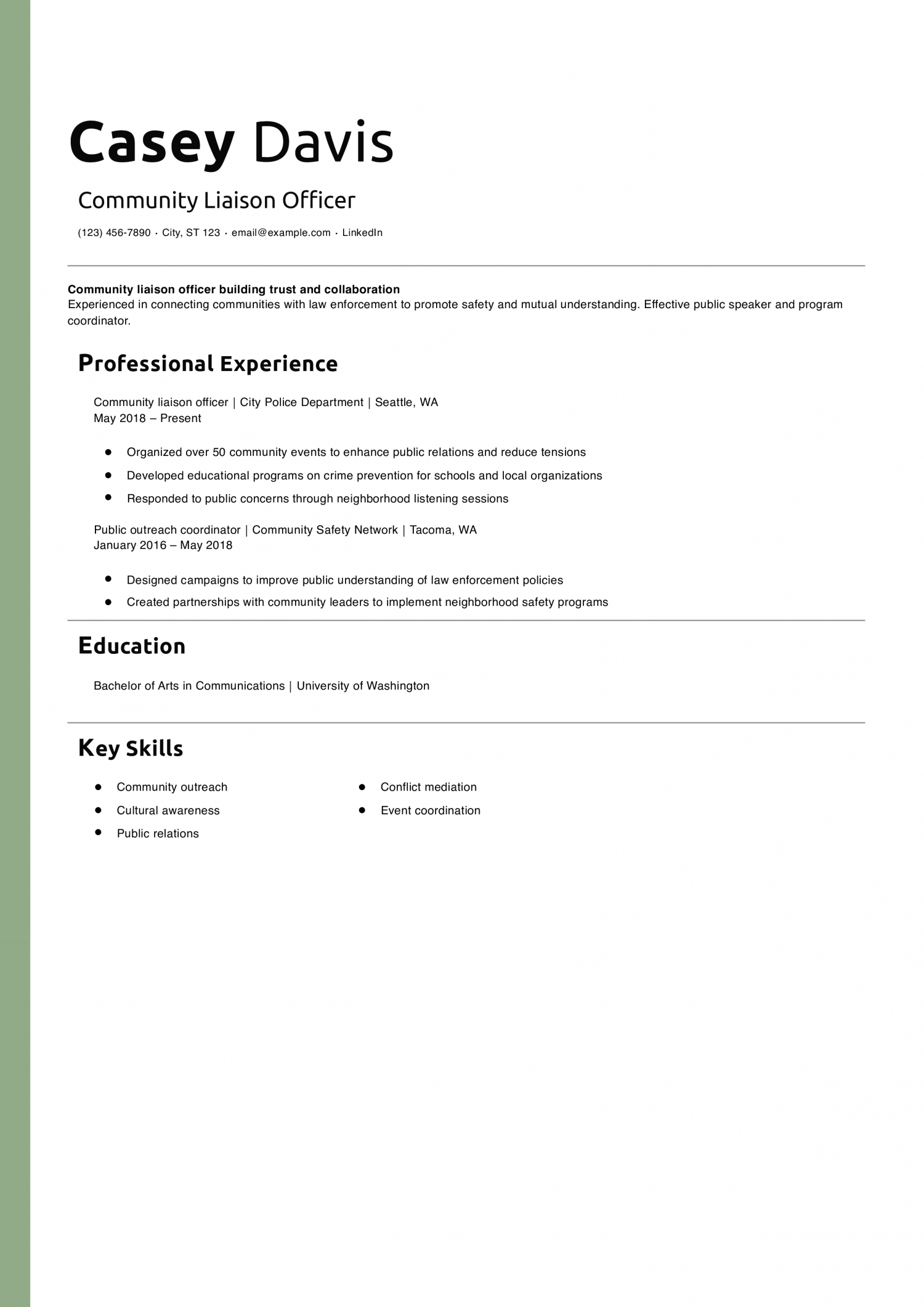
Why This Resume Is a Great Example
This resume is deeply people-focused, showing the human side of policing. It appeals to agencies looking to improve community engagement.
Key Tip:
Show your people-first approach through real examples. Use these personal statement ideas.
Intelligence Analyst Resume Example

Why This Resume Is a Great Example
This resume stands out for its national-level impact and specialized expertise. The use of data metrics clarifies her achievements.
Key Tip:
For analyst roles, clarity and specificity are crucial. Use these resume tips for detail-focused jobs.
Traffic Enforcement Officer Resume Example
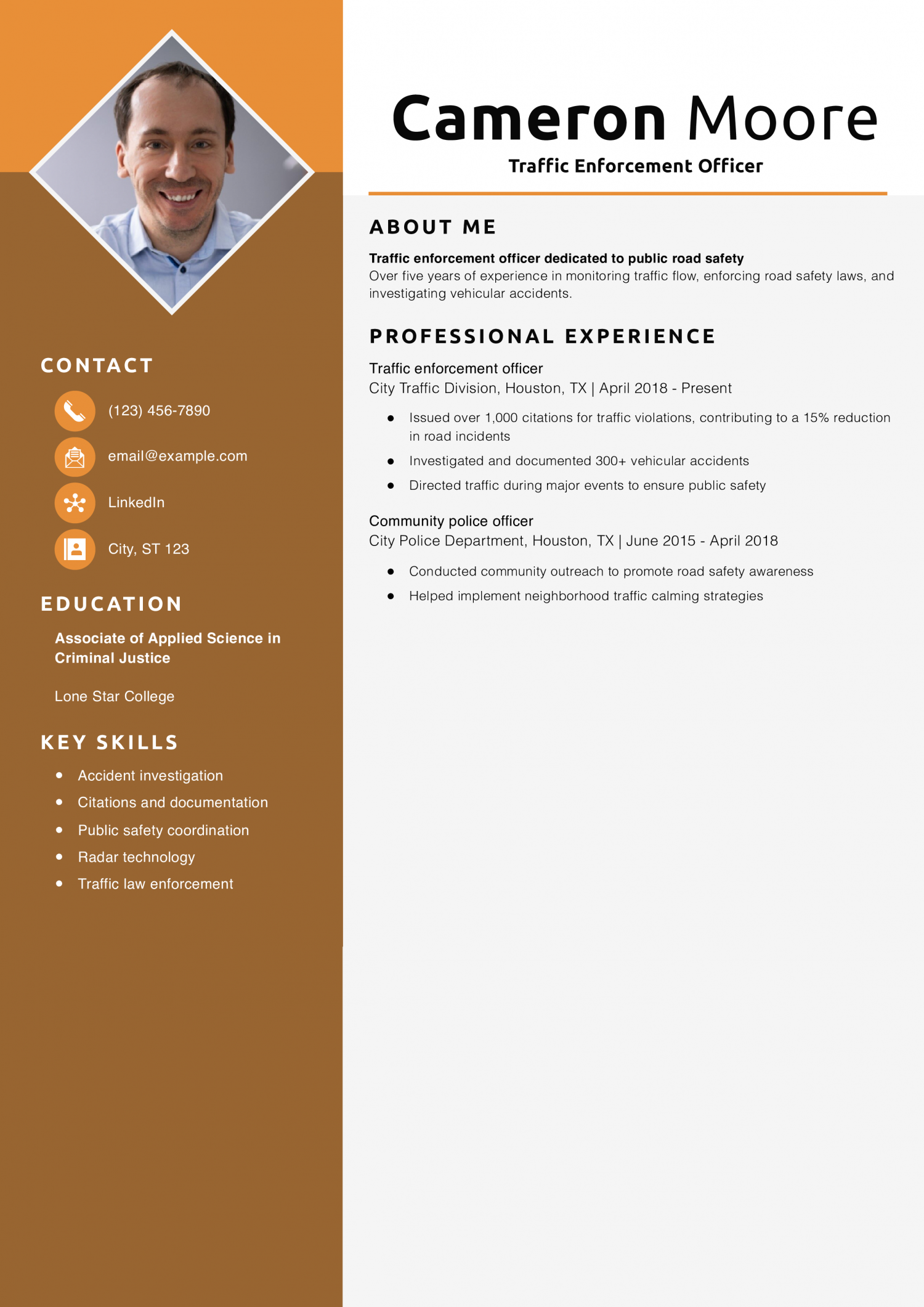
Why This Resume Is a Great Example
This resume focuses on results and community outcomes. It’s perfect for municipal hiring boards.
Key Tip:
If your work includes public events or outreach, say so. Add these extracurricular ideas.
School Safety Officer Resume Example

Why This Resume Is a Great Example
Drew’s resume highlights both protective and educational efforts. It’s ideal for school districts or academic institutions.
Key Tip:
Include specialized protocols you’ve followed. Learn how to list experience.
Harbor Patrol Officer Resume Example
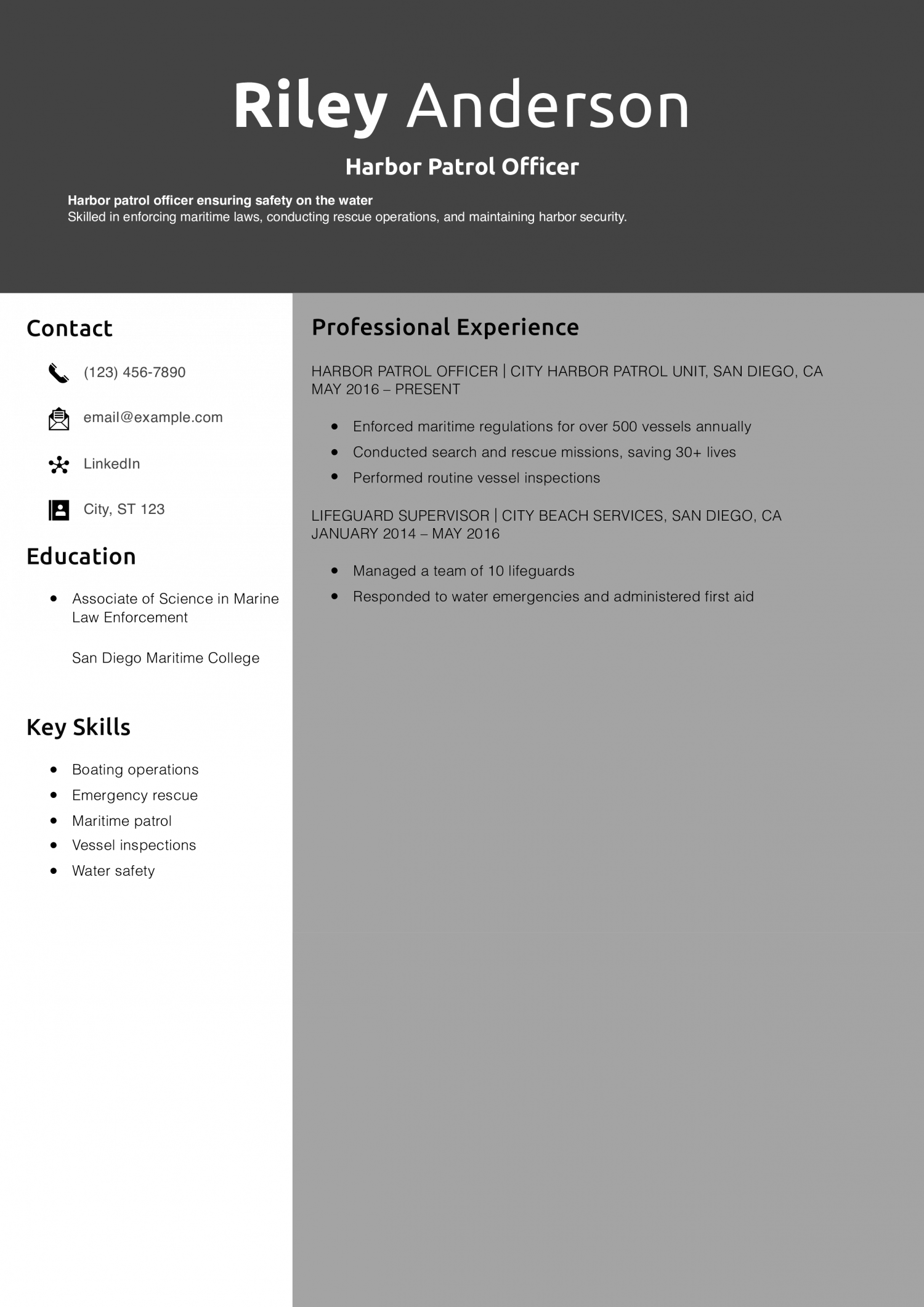
Why This Resume Is a Great Example
This experience is uniquely water-based, combining enforcement and lifesaving skills.
Key Tip:
Mention unique licenses like boating safety or scuba. See what else to include.
Airport Security Officer Resume Example
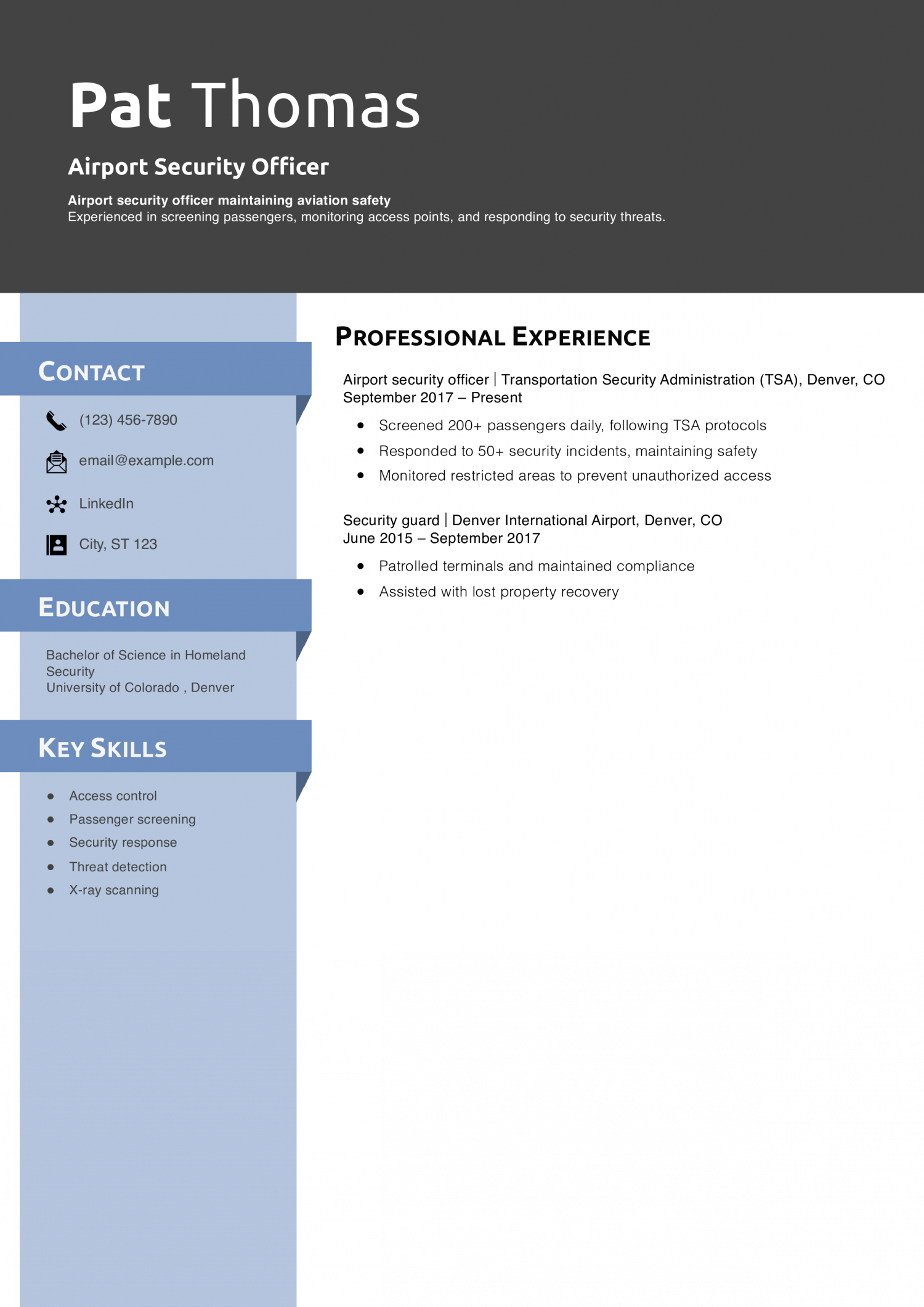
Why This Resume Is a Great Example
This resume delivers exactly what aviation security teams need: accuracy, vigilance, and reliability.
Key Tip:
Make sure your resume reflects both routine and emergency readiness. Add security keywords.
Law Enforcement Text-Only Resume Examples and Templates
How To Write a Law Enforcement Resume
A template can help you organize your career information for an effective law enforcement resume. Your law enforcement resume should usually have these sections:
- Contact information
- Profile
- Key skills
- Professional experience
- Education and certifications
Before starting work on your resume, jot down your preferences for your target job duties, organization size, or work culture. These notes will help you determine and emphasize your best career details as you develop each section.
1. Share your contact information
Give your full name, phone number, email address, location, and links to any online professional profiles. When applying to jobs, always double-check your contact info for accuracy – it’s as important as anything else on your resume.
Template
Your Name
(123) 456-7890 | [email protected] | City, State Abbreviation Zip Code | LinkedIn
2. Craft an outstanding profile with a summary of your law enforcement qualifications
Impress employers at the top of your resume by giving the three to five main reasons you can excel as their next hire. Consider what sets you apart from other candidates, such as your:
- Years of law enforcement-related work experience
- Main strengths or specialties
- Work style or approach (efficient, diligent, collaborative…)
- College degree(s) or certifications in your field
(Note: Most job seekers find it easier to write their profile last.)
Example
Experienced law enforcement officer with a strong background in public safety and community well-being, holding degrees in criminal justice, sociology with a concentration in criminology, and law enforcement. Proven record in conducting successful investigations, supervising junior officers, and engaging with the community to implement effective policing strategies. Certified Law Enforcement Analyst (CLEA), Certified Fraud Examiner (CFE), and holder of Peace Officer Standards and Training (POST) certification, with demonstrated skills in crisis management, conflict resolution, and report writing.
3. Showcase your law enforcement experience
For each recent job you’ve held, specify your title, company name, location, and work dates. Then, flesh out your description of each role to the extent it speaks to your target job. Give a brief overview of any unrelated jobs (even ones you held for a long time). And provide a detailed account of any highly related jobs (even those you had only briefly). Far from misleading, this approach gives hiring managers the clearest measure of your background relevant to the role they hope to fill.
Example
Law Enforcement Officer, New York Police Department, New York, NY | January 2019 to present
- Transitioned military skills into law enforcement, adapting combat training, strategic planning, and leadership skills to fit the needs of a civilian law enforcement agency
- Built strong relationships with community members, understanding their concerns, and working collaboratively to address public safety issues, contributing to a 20% decrease in neighborhood crime
- Demonstrated a comprehensive understanding of local, state, and federal laws, applying them effectively in daily duties and reducing procedural errors by 30%
Resume writer’s tip: Quantify your experience
When possible, cite relevant performance data and metrics to show the results you’ve achieved in law enforcement. Hard numbers put your work in context and give recruiters a better sense of your scope and impact.
Resume writer’s tip: Tailor your resume to each application
Before sending your resume, review it carefully against the job posting. Delete any details that don’t speak to the requirements, and consider using that space for more information about your relevant experience. This process takes extra time. But it can shorten your overall job search by giving you an edge over the many applicants who send a more general, less impressive resume.
What if you have no work experience?
Focus on your other credentials. Omit the “Professional Experience” section, and instead fill the page with details on relevant skills you’ve gained or projects you’ve worked on as an intern, volunteer, or student.
Regardless of your background, know that resumes are flexible. They can and should take whatever shape and structure they need to present your qualifications for the job, whether that means a lengthy work experience section or none.
4. Outline your education and law enforcement-related certifications
With the education and certifications sections, you can show you have a strong knowledge base in your field. Cite any credentials you’ve earned that speak to your law enforcement abilities. Below are templates and examples to help you organize this information on your resume (note, years are optional).
Education
Template:
[Degree Name], [School Name], [City, State Abbreviation] | [Graduation Year]
[Relevant honors, coursework, or activities]
Example:
Bachelor of Science in Law Enforcement and Justice Administration, Western Illinois University, Macomb, IL
Certifications
Template:
[Certification Name] | [Awarding Organization] | [Completion Date]
[Description if the credential is lesser-known but relevant]
Examples:
Certified Law Enforcement Analyst (CLEA), International Association of Crime Analysts
5. Outline your most useful law enforcement skills and proficiencies
A skills section lets you quickly show the different ways you can contribute and excel in your target position. It also helps your resume perform well on applicant tracking systems (ATS) employers use to screen candidates. Below, you’ll find some key terms and skills to consider for this section:
| Key Skills | |
|---|---|
| Community engagement | Community policing |
| Conflict resolution | Criminal investigation |
| Crisis management | Emergency response |
| Evidence collection | Federal law enforcement procedures |
| Forensic evidence analysis | Interagency collaboration |
| Reporting and documentation | Tactical operations |
Resume writer’s tip: Use common action verbs
One of the best ways to enhance your resume is by starting each bullet point with a strong action verb. Dynamic verbs help you make your resume clearer, concise, and more engaging than with nouns or noun phrases.
Do
- "Managed and motivated a 12-person team"
Don't
- "Responsibilities included management of a 12-person team"
The following list can help you find a good mix of action verbs for your law enforcement resume:
| Action Verbs | |
|---|---|
| Created | Decreased |
| Enforced | Enhanced |
| Fostered | Generated |
| Grew | Guarded |
| Improved | Increased |
| Introduced | Lowered |
| Managed | Monitored |
| Prevented | Ranked |
| Reduced | Reversed |
| Secured | Streamlined |
| Supervised | Updated |
| Won | |
How To Pick the Best Law Enforcement Resume Template
The best resume templates are simple and easy to edit. Choose one that lets you quickly add, delete, flesh out, rearrange, and reorder sections. With a flexible design, you can tailor and optimize your resume for each job application.
Frequently Asked Questions: Law Enforcement Resume Examples and Advice
First, look closely at the job post text and note any repeated or emphasized words. Compare these phrases to the language in your resume, particularly the profile and key skills sections. Then, seek ways to align your resume language with the job posting while not copying phrases or misstating your background.
For example, if the organization seeks someone collaborative, call out that aspect of your experience in your profile. Or say the community has many non-English speaking residents. Cite your foreign language skills in your profile and as a separate section farther down the document. With adjustments like these, you can make your resume more relevant to each opportunity.
The combination or hybrid format, which merges a functional resume's profile section with a chronological resume's experience section. Most modern resumes (including the ones on this page) follow the combination format because it gives hiring managers the clearest view of an applicant's strengths and work history.
To optimize your Law Enforcement CV for ATS, make sure to incorporate the right keywords from the job description, especially in sections like skills, experience, and certifications. Stick to a clean, straightforward layout that avoids complicated formatting or images, as these can confuse the ATS. This will help your CV get past the automated systems and into the hands of hiring managers.
Include a cover letter with your resume
A good cover letter sharpens your job application by directly explaining why you’re interested in the organization or job opening. When possible, quote or paraphrase text from the job posting and explain why it caught your attention.
Check Out Related Examples
Resume Templates offers HR approved resume templates to help you create a professional resume in minutes. Choose from several template options and even pre-populate a resume from your profile.

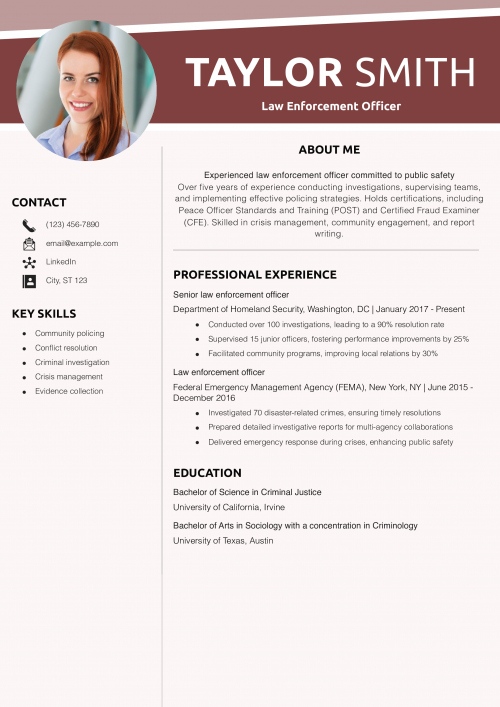
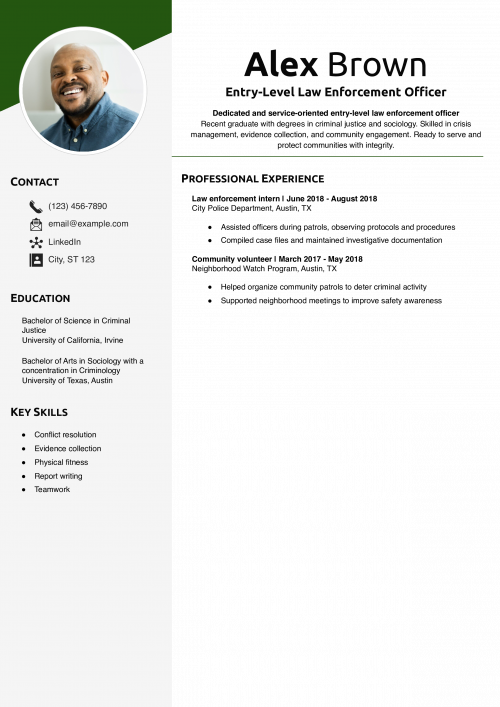
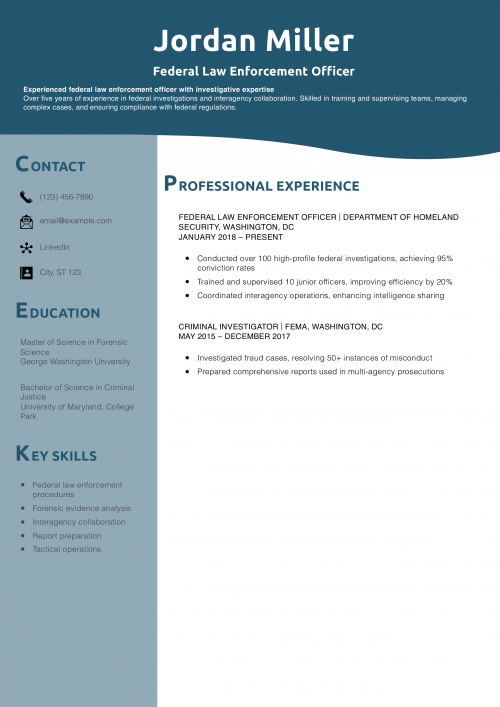
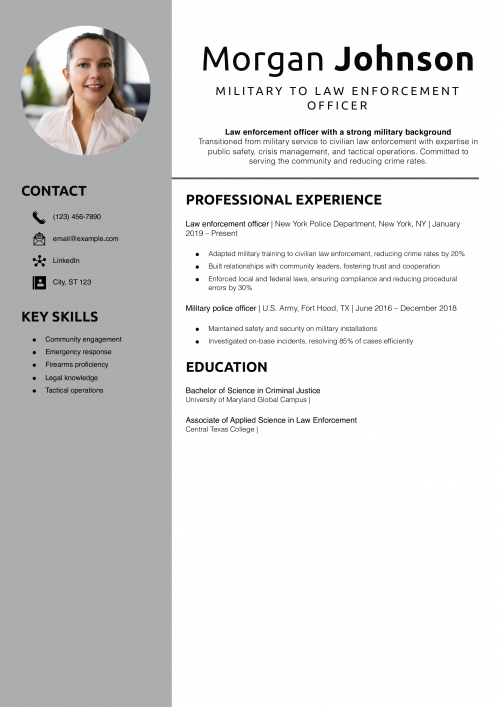
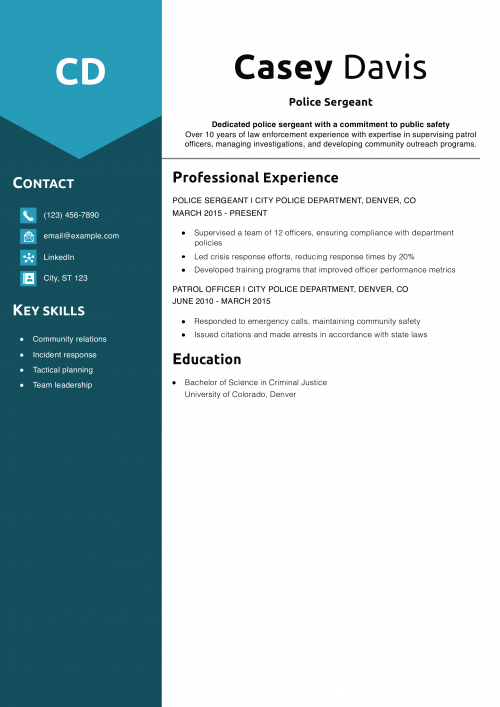
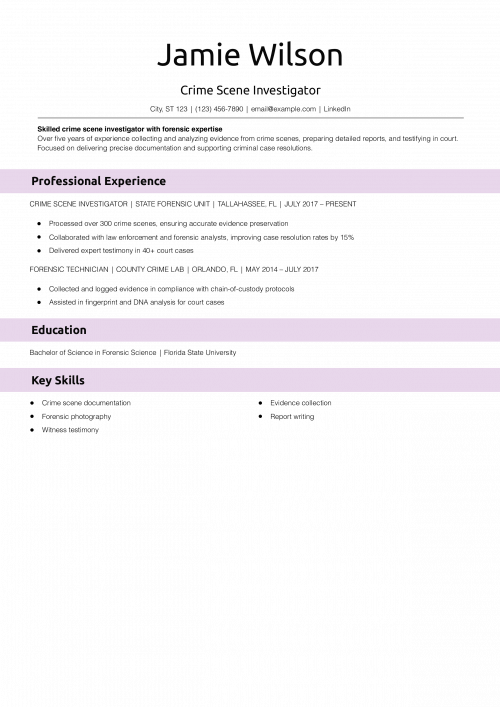
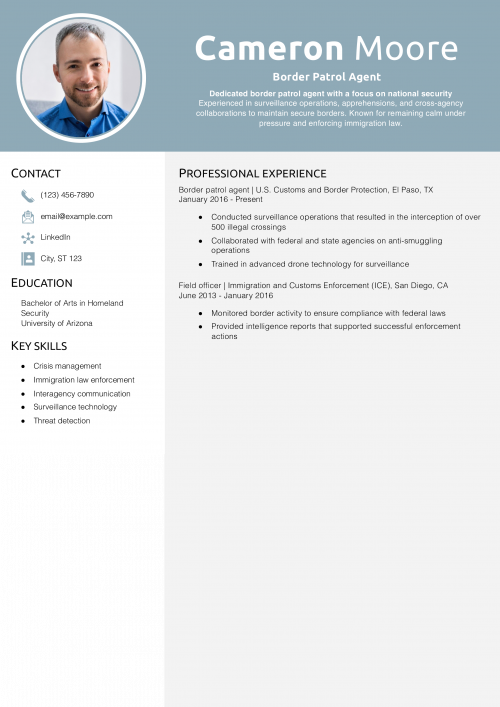
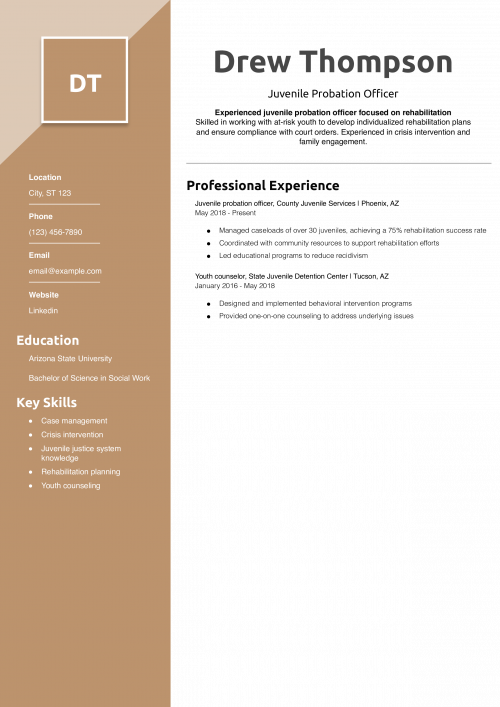
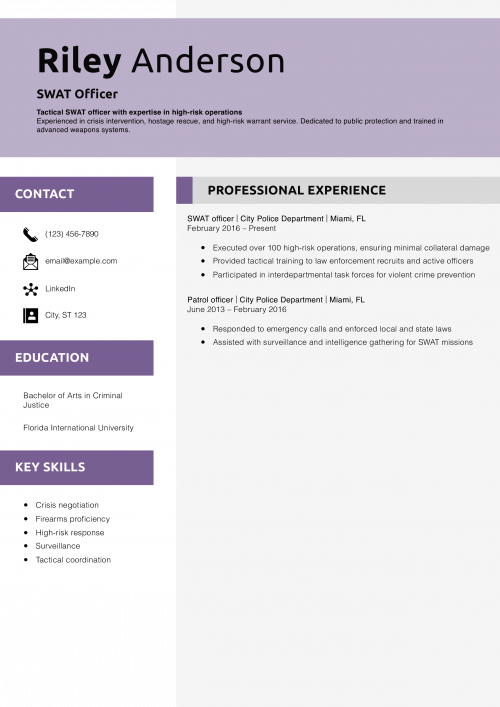
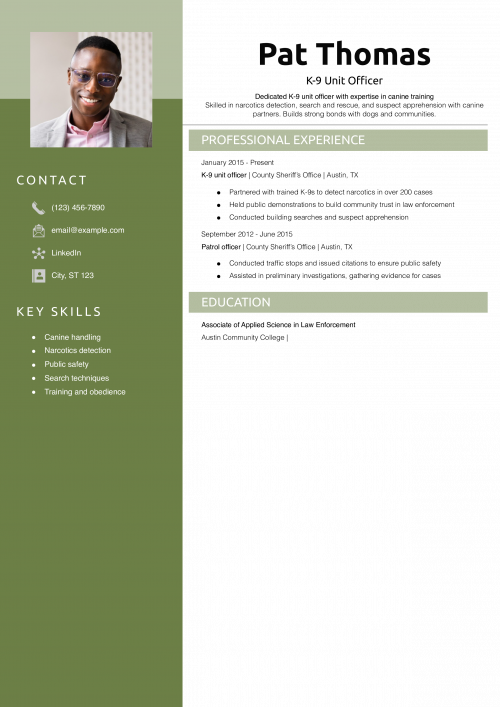
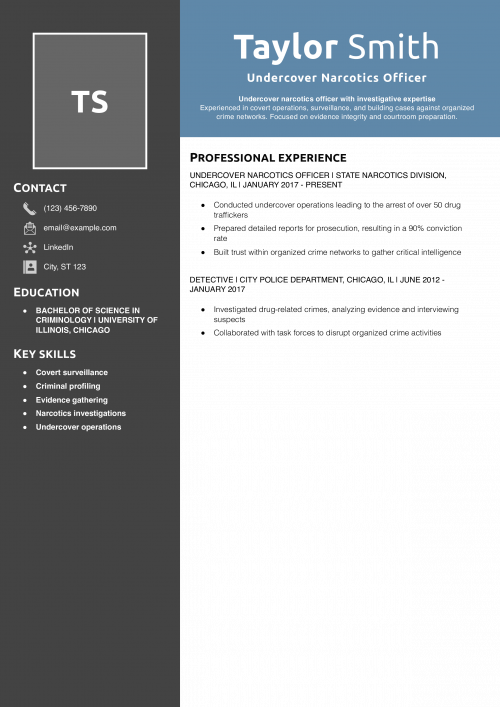
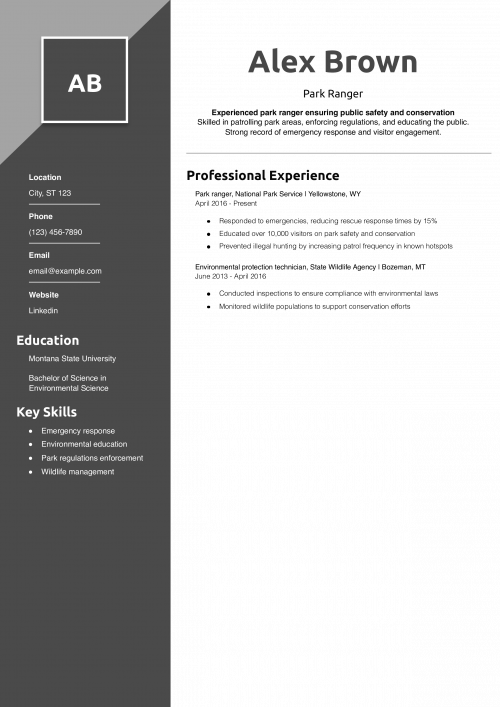
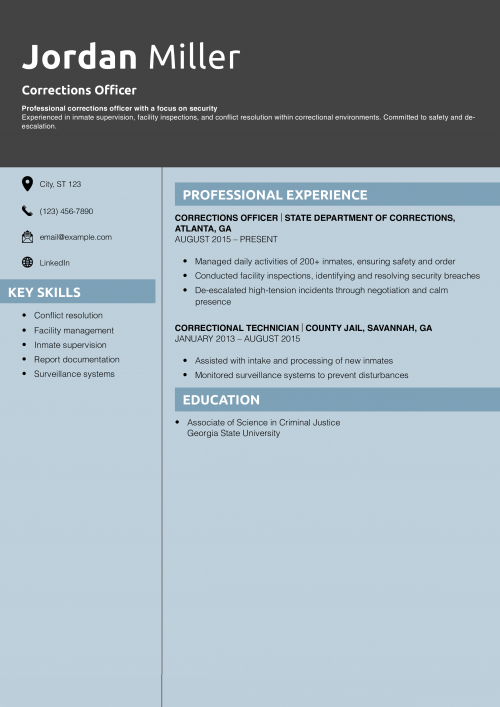
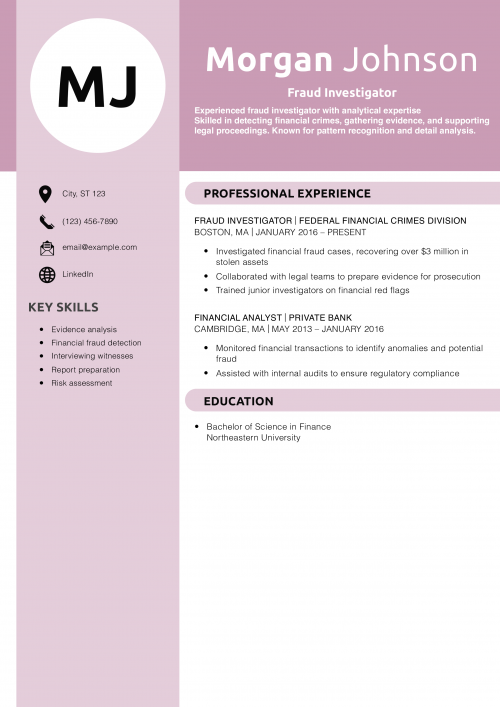
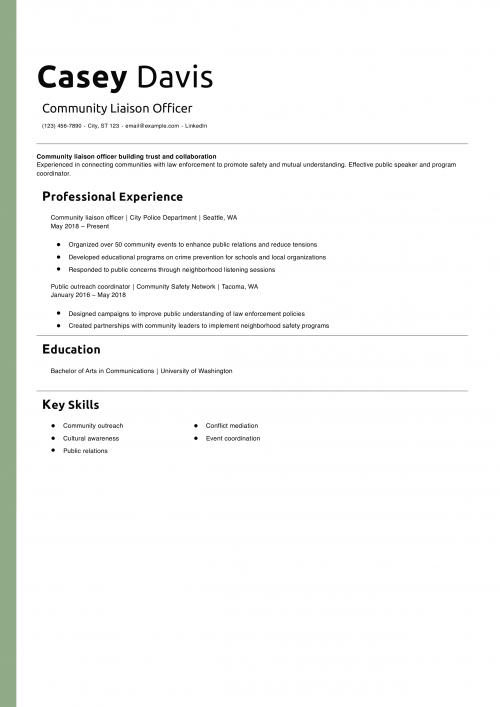

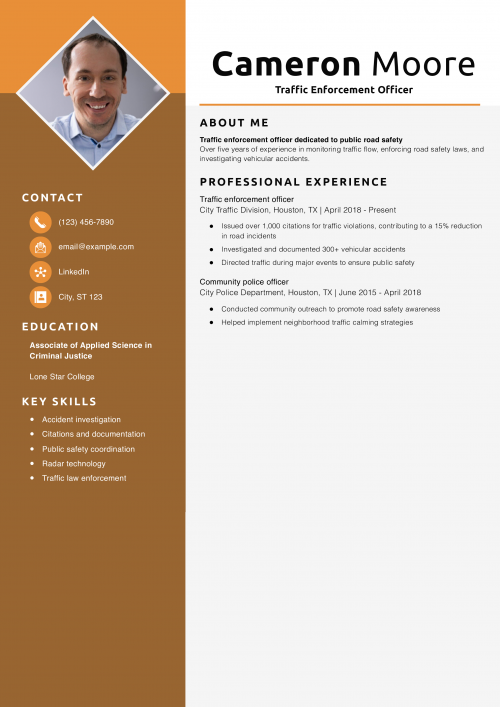

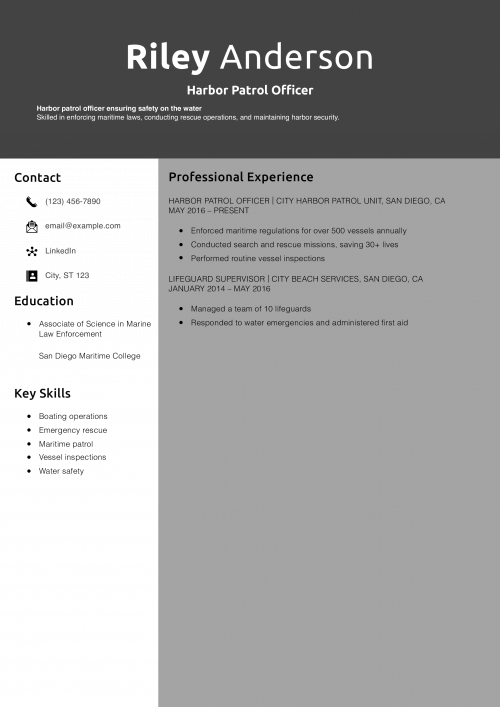
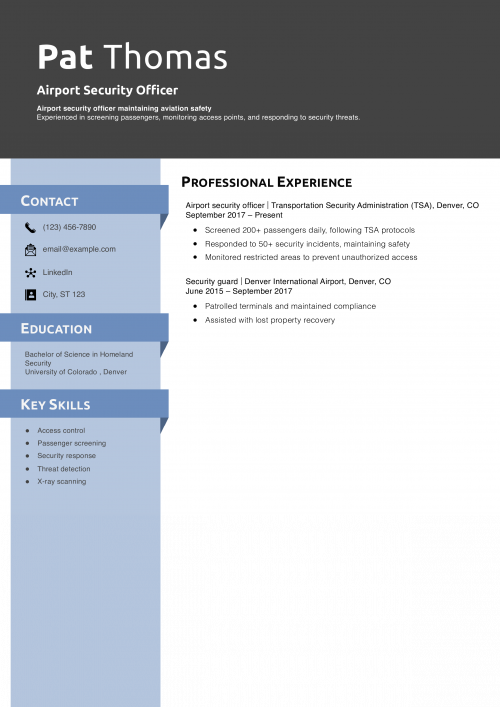

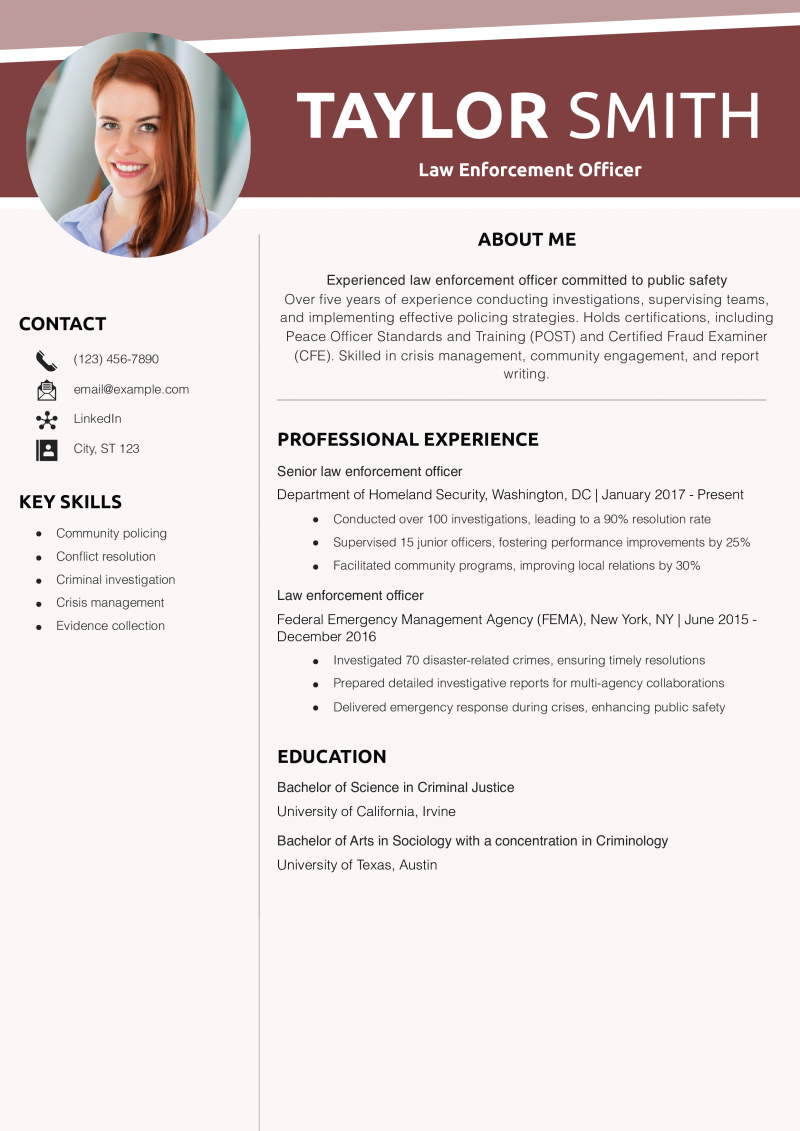
![5 Best Police Officer Resume Examples and Templates for [y]](/wp-content/uploads/2024/10/Police-Officer-Resume-Example.x400.pdf.jpeg)

